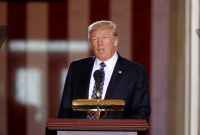Support strong Canadian climate journalism for 2025
The launch of the NAFTA renegotiation process faces one final delay in the U.S. Senate — one from within President Donald Trump's own party, no less — that's a symbolic example of the free-trade rift between the past and the present of the GOP.
The confirmation of Trump's trade czar is being held up by a Republican icon and former presidential nominee: John McCain, who wants to hear the new administration commit itself to trade principles the party has held dear for decades.
McCain's lingering concerns present a final hurdle before Robert Lighthizer gets confirmed as trade czar, at which point he can start leading the U.S.'s mandatory 90-day consultation before trade talks, so that negotiations with Canada and Mexico might start on schedule.
McCain confirmed Tuesday that he's asked a few questions, which are holding up unanimous consent so that Lighthizer's nomination can be voted upon without requiring several days of closure debates.
Lighthizer wrote a mildly critical newspaper column in 2008 that said McCain's support of free trade didn't prove he was conservative. But McCain dismisses suggestions he's holding a grudge.
Rather, he said, he's asking fundamental questions.
"It has a lot to do with whether a trade representative is for free trade or not. Or whether they want to be further isolationists and destroy our economy," McCain said Tuesday on Capitol Hill.
"I'm not saying I'm opposing him. I want answers to the questions. That's what senators do. That's the right of a senator. It's normal. It's what we do every day."
The administration desperately hopes to confirm Lighthizer as trade representative soon — perhaps as early as this week, according to remarks Tuesday by Commerce Secretary Wilbur Ross.
There is mounting time pressure to get going on NAFTA, Ross conceded.
With the Mexican election approaching and the U.S. midterm elections shortly thereafter, both the Mexican and American administrations have said they want a deal as early as the end of this year. Failure to get a deal within a few months could delay the process into 2019.
"The senate has been slow-walking the confirmation of Bob Lighthizer," Ross told a conference at the State Department.
"We will seek a far more aggressive meeting schedule (on NAFTA this fall) than has been the norm thus far."
Ross also repeated his frequently stated position that he's willing to negotiate a bilateral or trilateral deal, and isn't particularly wedded to either one.
A senior Senate staffer insisted Lighthizer's confirmation is a fait accompli — it's just a matter of timing.
Democrats sound willing to support Lighthizer.
The progressive, trade-skeptical Sherrod Brown of Ohio said he's spoken to Lighthizer four times since his confirmation hearing, really likes him, and can't understand what's taking so long.
"I think he's one of the best — maybe the best — single Trump nominee so far," Brown said.
"(Republicans) can point fingers at anybody they want. But it's a Republican senate with a Republican senate leader. I've tried to help Lighthizer. I don't know what the holdup is but I know (Senate Leader Mitch) McConnell and Trump aren't doing their jobs."
Democratic Sen. Claire McCaskill concurred: "They're having trouble on their side of the aisle. It's not us."
This bizarre role-reversal reflects the fact that, in U.S. politics, attitudes to trade don't follow neat partisan lines.
And whatever lines existed are shifting in the Trump era, according to a new poll.
A survey conducted in the runup to the renegotiations of NAFTA finds majority support for the agreement in all three countries involved. The Pew Research survey finds that of those who took part in the poll, 76 per cent of Canadian respondents, 60 per cent of Mexicans and 51 per cent of Americans supported NAFTA.
But there's turbulence under the surface of U.S. public opinion.
The poll suggests a massive gap in partisan attitudes, with only 30 per cent of respondents who voted Republican supporting NAFTA compared with 68 per cent of Democrats. That's the opposite of the partisan breakdown of a few years ago — and suggests a major Trump effect.
Republicans are suddenly the more trade-skeptical party, in keeping with Trump's attitude and shifting away from the views of senate Republicans — like John McCain.




Comments